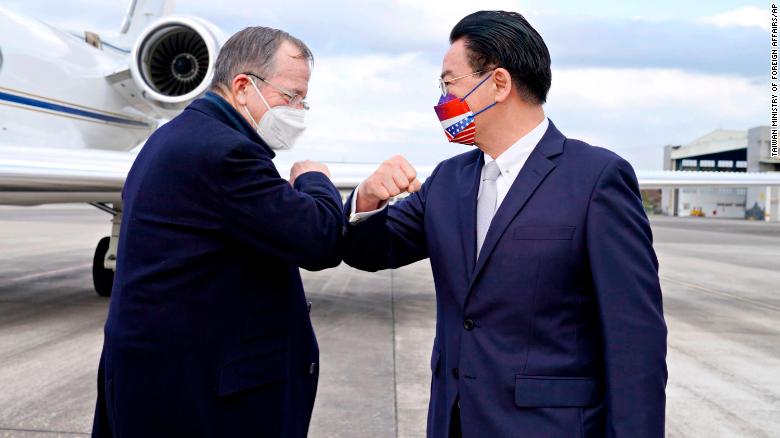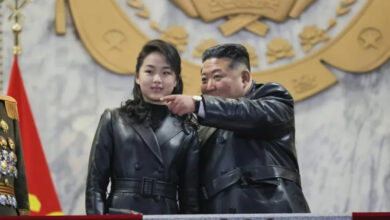
Taipei, Taiwan (CNN) – As the world focuses on Russia’s invasion of Ukraine, a delegation of former US officials has signaled American support for another democracy that’s come under increasing pressure from an authoritarian power.
The former defense and security officials, led by ex-Chairman of the Joint Chiefs of Staff Mike Mullen, met with Taiwan’s President Tsai Ing-wen on Wednesday during a two-day visit to the self-ruled island — which has expressed its solidarity with Ukraine.
“The Ukrainian people’s commitment to protect freedom and democracy and their fearless dedication to defending their country have been met with deep empathy from the people of Taiwan, as we too stand on the front line of the battle for democracy,” Tsai said in remarks Wednesday before the meeting.
“History teaches us if we turn a blind eye to military aggression, we only worsen the threats to ourselves. Now is the time for all democracies around the world to come together.”
Analysts have drawn comparisons between the authoritarian threat to Ukraine and Taiwan, which is located fewer than 200 kilometers (124 miles) from China’s southeastern coast. In Ukraine, that danger has been realized with unprovoked military action. In Taiwan’s case, China’s ruling Communist Party seeks eventual “reunification” — by force if necessary — with the island it claims as its territory despite having never governed it.
The timing of the former US officials’ visit appeared poised to assuage Taipei’s fears about its own future, with Mullen, a retired admiral who was a top military adviser to former US Presidents George W. Bush and Barack Obama, saying he hoped the visit would “reassure” Taiwan.
“I do hope by being here with you, we can reassure you and your people, as well as our allies and partners in the region, that the United States stands firm behind its commitments,” Mullen said, in an apparent reference to Washington’s longstanding support for Taiwan’s defense.
“We come to Taiwan at a very difficult and critical moment in world history. As (US) President (Joe) Biden has said, democracy is facing sustained and alarming challenges, most recently in Ukraine. Now more than ever, democracy needs champions.”
Taiwan’s support for Ukraine
The escalating conflict in Ukraine has loomed large in Taiwanese news coverage and evoked an outpouring of sympathy from the Taiwanese public across the political aisle.
Since last week, dozens of protesters gathered outside Russia’s representative office in Taipei on three separate days, waving the Ukrainian flag and placards reading “no war.” Skylines in Taiwanese cities were also lit up in blue and yellow — the colors of Ukraine’s flag — including the iconic Taipei 101 skyscraper.
For its part, Tsai’s government has swiftly condemned the Russian invasion, while Premier Su Tseng-chang said Tuesday that Taiwan would block some Russian banks from the SWIFT international payments system “in lockstep” with economic penalties imposed by Western countries. They had also sent medical aid to Ukraine, Su said.
According to the government, major Taiwanese chipmakers — which account for more than half of the world’s output of semiconductor chips — have all pledged to comply with sanctions against Russia.
In comments Wednesday, after meeting with the US delegation, Tsai said Taiwan would set up a donation account for Ukraine and that she, Su, and Vice President William Lai would each donate a month’s salary.
‘Rock-solid relationship’
Relations between Taipei and Beijing are at their lowest point in decades.
In recent months, China’s military has sent record numbers of warplanes into the air around Taiwan while diplomats and state-run media warned of a possible invasion unless the island toes the Chinese Communist Party’s line.
Tsai has said Taiwan’s military must maintain a high level of vigilance and monitor activities on the Taiwan Strait, in light of security concerns linked to Russia’s invasion of Ukraine, which came weeks after a high-profile meeting between Russian President Vladimir Putin and Chinese leader Xi Jinping.
China’s leaders may be watching Ukraine with an eye on Taiwan
Wen-Ti Sung, a lecturer in the Taiwan Studies Program at the Australian National University, said the timing of the American delegation’s visit was “clearly tied to the Ukraine crisis” and Mullen’s role as its head signaled that defense discussions would “feature prominently on the agenda.”
“At this moment when Taiwan is wondering whether it’s going to be Ukraine today, Taiwan tomorrow … the presence of a senior and bipartisan ex-governmental delegation is here to illustrate that US security commitment indeed is different and is higher to Taiwan than it is to Ukraine,” he said.
Compared with Ukraine, Taiwan plays a different role in geopolitics and global supply chains, Sung added.
The delegation was appointed by Biden, Taiwan’s Ministry of Foreign Affairs spokeswoman Joanne Ou said Monday night, with Taiwan’s presidential office spokesman Xavier Chang saying ahead of the visit that it demonstrates the “rock-solid” relationship between Washington and Taipei, “especially at a time when the situation in Ukraine remains severe.”
In addition to their meeting with Tsai, the delegates are expected to meet with Taiwanese Defense Minister Chiu Kuo-cheng.
China’s response
Beijing decried the visit on Tuesday calling it “futile,” and urging Washington to “prudently handle Taiwan-related issues” to not further damage China-US relations.
“The resolution and will of the Chinese people to safeguard national sovereignty and territorial integrity are unshakable. It is futile for the US to send anyone to show its so-called support for Taiwan,” spokesperson Wang Wenbin said in regular press briefing.
Beijing has refused to condemn Russia’s attack on Ukraine or refer to the full-scale assault on the country as an “invasion.”
It has dismissed comparisons between the situation in Ukraine and its own claims on Taiwan, with Foreign Ministry spokesperson Wang saying on February 22, “I would like to stress that there is but one China, and Taiwan is an inalienable part of China’s territory.”
Mainland China and Taiwan have been governed separately since the end of the Chinese civil war more than 70 years ago, when the defeated Nationalists retreated to the island.
The US ended its formal diplomatic relationship with Taipei in 1979 when it recognized the government in Beijing, but it has retained an unofficial relationship, which includes visits from delegations often made up of retired officials or lawmakers, and is bound by law to sell arms to Taiwan for its self-defense.
In an exclusive interview with CNN last October, Tsai became the first Taiwan President in decades to acknowledge the presence of US troops on the island for training purposes, though she said the number was “not as many as people thought”.
The latest visit comes after the United States last month approved the possible sale of an estimated US$100 million of military equipment and services to Taiwan.




